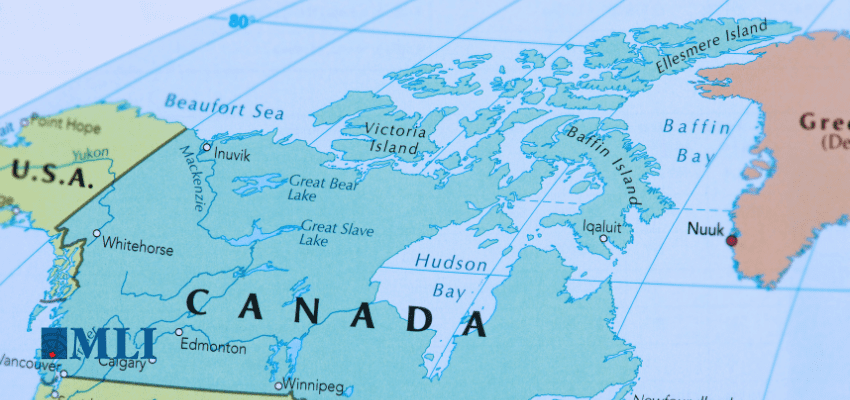This article originally appeared in the Hill Times.
By Madeleine Redfern and Sean Boyd, June 28, 2024
In today’s complex geopolitical environment, Canada is under pressure from its allies to play a larger role on the world stage, especially as it relates to Arctic security.
For decades, domestic policy and investment priorities regarding strategic Arctic infrastructure and security have been overlooked by successive governments of all stripes. A bold and adequately funded Arctic strategy is the nation-building project that will demonstrate the strength and potential of the North both to Canadians and our allies, and serve as the foundation for our economic and political future for decades to come—and the time to act is now.
The recently announced Arctic Defence Strategy, Our North, Strong and Free, includes $8.1-billion in new spending over the next five years, and plans to establish a network of northern operational support hubs.
This strategy rightly acknowledges Canada as a frontline NATO country sharing the largest maritime border in the world with Russia, and one which can no longer ignore commitments to collective security. The Arctic Defence Strategy is a step in the right direction. The Arctic region presents Canada with an opportunity to contribute to the NATO alliance in a way which fits our national identity, and is an opportunity to show our allies Canada still matters in defence and security.
To ensure success and wide support, Canada’s Arctic Defence Strategy must be part of a broader socio-economic Arctic strategy rooted in the understanding that Canada’s long-term goals in the region depend on the development of Northern and Indigenous communities. Fundamentally, sovereignty is about people.
Long gone are the days when Arctic defence can be considered in isolation from Indigenous Peoples. Any successful strategy must be done in collaboration with the communities whose socio-economic vibrancy is key to the assertion of Canada’s sovereignty.
Canada’s northern premiers have all requested that this countryt takes urgent action to address the infrastructure gap. Canada has fallen far behind other nations in the Arctic with respect to infrastructure and security investments in their northern regions. Russia is currently spending 15 times more on infrastructure in the Arctic than any other Arctic Council nation. It has 17 deepwater ports in the Arctic while Canada has none.
Canada urgently needs to invest in multi-use infrastructure including ports, airstrips, housing, and clean power generation to end reliance on diesel. These should also be future-proofed so that investments meet the needs of today and the next 50 years. Canada must be mindful that these investments do not dramatically increase the cost of living for northerners given that a significant number of northerners are living in poverty.
But physical infrastructure alone is not enough. More must be done to enhance the social infrastructure needs of northern communities, including health care, education, and food security. Investments must be made in close collaboration with communities so we can avoid repeating the mistakes of the past, where investments resulted in numerous underwhelming or failed projects that did not suit the Arctic environmental realities, and/or provided little to no local benefits including failing to support Indigenous people’s economic opportunities. Worse yet is some of those investments and projects created risks and liabilities with respect to the environment with no resources to remediate.
At the same time, the federal government has been rightly promoting the vast untapped mineral potential of the North as an opportunity for the supply chains of the low carbon economy of the future. Unfortunately, due to lack of infrastructure, much of these resources are inaccessible. Canada’s natural resource sector is the backbone of our economy—responsible for 14.9 per cent of our GDP, and one out of every 10 jobs in the country. Unlocking the potential of our resource-rich North will create economic growth for decades to come.
Canada’s political leaders need to seize this opportunity, and connect the dots on a range of policy goals. A focus on the Arctic will enable Canada to meet its NATO and continental security commitments in a unique way that plays to our strengths, national identity, and pride. Direct and indirect investment in dual-use infrastructure supports communities, industry, emergency preparedness, and defence purposes. In addition to the economic growth created though mineral investment across Canada, a bold Arctic strategy supports Indigenous economic reconciliation by unlocking employment, training, and business opportunities for Inuit Peoples, and generating royalties and tax revenues both for local and Indigenous governments.
Co-ordination of these overlapping policy priorities is critical. A national program that sets out a vision, goals, and objectives, and clear roles and responsibilities of all stakeholders is needed to ensure success. Such a program must be underpinned by a compelling narrative for Canadians portraying this focus on the Arctic as an investment in our national future which will create multi-generational opportunity if done right. Rarely does an opportunity emerge with the convergence of so many policy priorities and ripe impetus for action. A bold Arctic strategy is the nation-building project that Canada needs now.
Madeleine Redfern is chief operating officer of CanArctic Inuit Networks. Sean Boyd is the board chair of Agnico Eagle Mines Limited.






